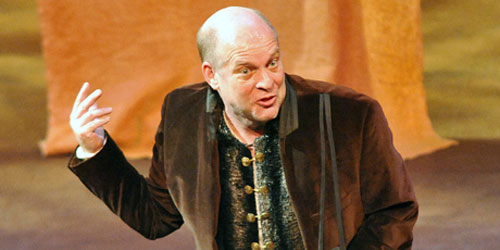By Bridgette M. Redman

Under the best of circumstances, "Richard III" is a challenging play to present. It is heavy with historical and political maneuvering, lengthy in its telling and filled with facts that stretch at the imagination. And while it is the wet dream of aficionados of the War of the Roses and filled with the delightful villainy of Richard III, enemy to Shakespeare's patron queen and her house, it can be ponderous to modern audiences who are not up to date with who was on what side and what came before the play began. There is a heavy burden placed upon the director and performers in any production to make sure the brilliant story of this history gets told.
The Michigan Shakespeare Festival does much to shoulder this burden and create a production that is vivid and true to the Bard's tale. David Turrentine creates a fully realized Richard III, whose malformed shape comes in the forms of a withered arm and a dragging leg. Turrentine makes the most of these malformations, managing full gestures even with the one arm constantly tied to his side. He sneaks and plots and never stints on his evil plotting.
While this is a play that is primarily focused on the machinations of the men, the women are haunting and among the few who are openly honest about their motivations and desires, even when caught up in the politics. Stacy Stoltz's Anne is tragic, Amy Montgomery's Margaret is angry and bitter, and Janet Haley's Elizabeth traverses the journey from joyous to beleaguered to devastated.
Wesley Scott's Buckingham helped to reveal the new lows of Richard's treachery by being one of the few who were openly supportive of Richard without being steeped in his villainy. He was honest, devoted to England and gave a credible performance of being able to support the man who had already revealed to the audience that he was up to no good.
Many of the scenes were fascinating and drew the audience into the horrid abuses of power and the feelings of impending doom upon those who were unable to protect themselves from what they could not see coming.
The MSF production was, however, plagued by at least one circumstance that may have had its effects on the cast – the actor playing Buckingham was rushed to the hospital the night before opening and diagnosed with a kidney disease, making him unable to perform. David Blixt, the actor playing both King Edward and Richmond stepped in with a script and did a fine job balancing the three roles that fell to him. However, on opening night other performers stumbled with their words, went up and were unable to recover and stepped on each other's lines.
Perhaps more troubling was the inability to determine whether Richard III was intended to be a clown and leader of clowns or a villain. Turrentine was too often smarmy when it was unnecessary. The scene where he wooed Anne, always a difficult one that stretches at credibility, became even tougher to accept because he made no attempt to pretend at sincerity when talking to Anne. The audience was left to believe that his triumph in wooing wasn't because of his great deviltry, but because of her foolishness.
All of Shakespeare's plays, even the tragedies, are filled with comedic bits, witty wordplay and the opportunity for physical clowning. Too often in this production, however, they were thrown in simply because the opportunity existed to ask for a laugh rather than because it fit into the story. It was hard to feel horror when the executioners were consistently clowns and the deaths were occasions for humor. Worse were the times when something comic in the background distracted from what should have been the focus – such as a dead body being loaded up on the table like a dirty dish as Richard tries to tell the audience he will now woo the woman whose brothers and uncles he has murdered.
There was, though, much in this production that was a pleasure to watch and hear. Misti Bradford's fully accessorized costumes created a medieval and moody feel. Jeromy Hopgood's hanging banners re-created the historical house sigils that represented each major player. The set became device as banners were gradually ripped down as their owners fell to Richard's treachery. For those not familiar with the heraldry of each house, some sort of cheat sheet might have been helpful – or even the device of having the characters at some point standing before their sigil. The banners were especially effective at giving the audience visual clues about why certain characters were given the nicknames in the text that they were.
"Richard III" demands much of its performers and its audiences. The rewards have the potential to be great – which is why "Richard III" remains one of the most popular histories that Shakespeare wrote. This production had its rough edges on opening night, but also has much to recommend it with its powerful acting and high production values.
REVIEW:
'Richard III'
Michigan Shakespeare Festival at Michael Baughman Theatre on the campus of Jackson Community College, 2111 Emmons Rd., Jackson. Plays in rotating repertory through Aug. 12. 192 minutes. $32-$39. 517-998-3673. http://www.michiganshakespearefestival.com










